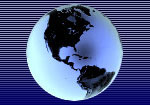Its boosters allegedly stuffed electronic ballot boxes by the thousands. Its critics wrote Congress, urging its recall.
And the White House pointedly backs it.
Much ado, about a stamp.
The piece of postage features a greeting for two major Islamic holidays rendered in gold Arabic calligraphy against an
azure background.
"Eid Mubarak," it reads in homage to Eid al-Fitr, the end of Ramadan, the monthlong period of fasting and
prayer that will conclude this year on Dec. 6, and Eid al-Adha, a celebration during the pilgrimage to Mecca in February.
The U.S. Postal Service first issued the stamp 10 days before the terrorist attacks on the World Trade Center and the Pentagon.
Last month, it reprinted the stamp as part of its permanent holiday series, despite calls from some customers to stop selling
it.
"What we were looking at was public sentiment," said Ray Daiutolo Sr., a spokesman for the Postal Service in the Philadelphia
region. "It's the law of supply and demand. They were popular."
Advocacy groups for American Muslims - although engaged in more substantive battles against hate crimes, detentions and
ethnic profiling in the last year - hailed that decision as a milestone.
"It was a pretty sizable victory," said Aminah Assilmi, 58, a grandmother from Kentucky and a convert to Islam who started
lobbying the postmaster general for the stamp about five years ago. "That stamp became a symbol to everyone of saying, 'Yes,
we're a part of America.' And now other people see that, too."
But in the immediate aftermath of Sept. 11, it was not clear that almost all of the original 75 million Eid stamps
issued would sell.
Conservative talk-show hosts pointed out that "Eid" spelled backward is die. Some post offices reportedly
stopped carrying the stamps. And a poster advertising Christmas, Kwanzaa and other holiday stamps omitted the Eid stamp.
The Postal Service quickly recalled and reprinted the posters, saying the omission had been an accident.
The Free Congress Foundation, a conservative think tank in Washington, told lawmakers to print the image of the World Trade
Center over the Arabic script to remind people, as one of its officials put it, "what Islam is really like."
The stamp even gave some self-proclaimed liberals pause.
"I just could not bring myself to use it," said John Dunn, a native New Yorker and publisher of the weekly Mekeel's and
Stamps Magazine for collectors. "It just cut too close to the bone for me. If Israelis had knocked down the World Trade Center,
I would not have been able to use the Hanukkah stamp."
To save the stamp it had lobbied for so hard and long from this philatelic backlash, the American Muslim Council mobilized
its members.
It asked doctors and small-business owners to forgo their postage machines for Eid stamps, just as it had.
As recently as last week, physician Abbas Hussain bought a few hundred Eid stamps from his post office in Voorhees
to use on mail sent from his Merchantville practice.
"There is a need for awareness of Muslims in the U.S.," he said.
And the council asked sympathizers to cast cyber ballots for the Eid stamp as their favorite in a survey this year
by Ohio-based Linn's Stamp News, another magazine for collectors.
More than 13,000 people - almost three times the number who usually participate in the annual survey - obliged.
Only images of Frida Kahlo, the Mexican artist and communist, and Elvis Presley generated as much controversy on a piece
of postage as the Arabic script has, stamp enthusiasts say.
Michael Schreiber, despite his position as editor of Linn's Stamp News, doesn't understand the fuss.
"Stamps aren't all that worth getting worked up over," he said.
The players in the Eid stamp saga would disagree.
"It's quite an achievement for us [as American Muslims] to have something that goes everywhere," said Mohamed Zakariya,
60, the California-born artist who designed the stamp.
For Paul Weyrich, president of the Free Congress Foundation, it is a politically correct acknowledgement of the enemy.
"Symbols matter," he recently wrote to his group's members.
The Bush administration certainly realizes the truth of that statement. It touted the stamp at a Ramadan banquet at the
White House this month.
And during videoconferences arranged by the State Department in the last year, Feiz Rehman, communications director for
the American Muslim Council, mentioned the stamp to Islamic school principals and religious leaders in Bulgaria.
"As an American, I'm proud of it," he said. "It sent a good message out to world. That's an American message of diversity,
coexistence and tolerance."

